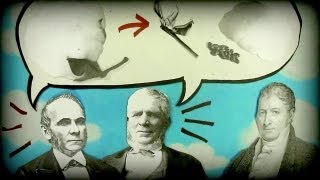(单词翻译:单击)
This is the story of an invention that changed the world.
这是一个关于发明改变世界的故事
Imagine a machine that could cut 10 hours of work down to one.
想象一下一个能把工作时间从十个小时缩短到一个小时的机器
A machine so efficient that it would free up people to do other things, kind of like the personal computer.
一个非常有效,可以让人们去干别的事的机器,类似于电脑
But the machine I'm going to tell you about did none of this.
但是我要跟你说的机器跟这些一点关系都木有。
In fact, it accomplished just the opposite.
事实上,这种东西做的恰好相反
In the late 1700s, just as America was getting on its feet as a republic under the new U.S Constitution,
18世纪晚期,美国跟随新美国宪法正在逐渐实行共和政体
slavery was a tragic American fact of life.
但奴隶制度是美国人生活的一个悲惨的事实
George Washington and Thomas Jefferson both became President while owning slaves,
乔治华盛顿和托马斯杰弗逊都在拥有奴隶的情况下成为了总统
knowing that this peculiar institution contradicted the ideals and principles for which they fought a revolution.
这种奴隶制度反驳了他们实行改革的理想和原则
But both men believed that slavery was going to die out as the 19th century dawned.
但他们都相信奴隶制度将会在十九世纪末消失
They were, of course, tragically mistaken. The reason was an invention,
当然,他们错了。原因是一个发明
a machine they probably told you about in elementary school: Mr. Eli Whitney's cotton gin.
一个小学生都知道的机器:伊莱·惠特尼的轧棉机
A Yale graduate, 28-year-old Whitney had come to South Carolina to work as a tutor in 1793.
28岁的耶鲁大学毕业生惠特尼,在1793年的时候来到卡罗莱纳州南部担任导师工作
Supposedly he was told by some local planters about the difficulty of cleaning cotton.
他被当地的一些农民告知,整理收获的棉花非常的难
Separating the seeds from the cotton lint was tedious and time consuming.
把棉花和种子分离开十分的无聊而且很耗时
Working by hand, a slave could clean about a pound of cotton a day.
一个奴隶手工分离棉花的话,一天只能做一磅
But the Industrial Revolution was underway, and the demand was increasing.
但那时候工业革命正在进行,棉花的需求也在增加
Large mills in Great Britain and New England were hungry for cotton to mass produce cloth.
在英国的一些大工厂急需棉花来制造衣服
As the story was told, Whitney had a 'eureka moment' and invented the gin, short for engine.
正如故事所说,惠特尼灵光一动发明了轧棉机
The truth is that the cotton gin already existed for centuries in small but inefficient forms.
事实上,轧棉机已经存在了几个世纪了,但效率较低

In 1794, Whitney simply improved upon the existing gins and then patented his 'invention':
1794年,惠特尼把原有的轧棉机改进之后,就把它当做自己的发明
a small machine that employed a set of cones that could separate seeds from lint mechanically, as a crank was turned.
当曲柄被转动,这个小机器就可以分离种子和棉花
With it, a single worker could eventually clean from 300 to one thousand pounds of cotton a day.
使用轧棉机的话,一个工人一天可以轧棉300到1000磅
In 1790, about 3,000 bales of cotton were produced in America each year.
1790年,美国每年可生产3000捆的棉花
A bale was equal to about 500 pounds.
一捆棉花重500磅
By 1801, with the spread of the cotton gin, cotton production grew to 100 thousand bales a year.
1801年,轧棉机普及之后,棉花产量上升到每年十万捆
After the destructions of the War of 1812, production reached 400 thousand bales a year.
1812年战争结束之后,棉花生产量达到了每年四十万捆
As America was expanding through the land acquired in the Louisiana Purchase of 1803,
1803年,美国在向路易斯安那州扩展领土的时候
yearly production exploded to four million bales. Cotton was king.
棉花产量达到了四百万捆,变成了棉花大国。
It exceeded the value of all other American products combined, about three fifths of America's economic output.
棉花的价值超过了美国生产的其他东西的总和,占美国经济输出的五分之三
But instead of reducing the need for labor, the cotton gin propelled it,
但轧棉机并没有减少劳动力的需求,相反
as more slaves were needed to plant and harvest king cotton.
更多的奴隶被要求去种植 收获棉花
The cotton gin and the demand of Northern and English factories re-charted the course of American slavery.
轧棉机的出现和工厂的需求使美国的奴隶制度更加严重
In 1790, America's first official census counted nearly 700 thousand slaves.
1790年,美国人口普查统计出大约有七十万的奴隶
By 1810, two years after the slave trade was banned in America, the number had shot up to more than one million.
到了1810年,也就是美国禁止奴隶交易的两年后,奴隶的数量超过了一百万
During the next 50 years, that number exploded to nearly four million slaves in 1860, the eve of the Civil War.
接下来的五十年里,在1860年美国内战前夕,奴隶数量达到了将近四百万。
As for Whitney, he suffered the fate of many an inventor.
对惠特尼来说,跟很多发明家一样
Despite his patent, other planters easily built copies of his machine, or made improvements of their own.
很多农民不管他的专利,轻易地复制了他的发明或者将他们自己的轧棉机改进
You might say his design was pirated.
你可能会说惠特尼的设计本来就是山寨的
Whitney made very little money from the device that transformed America.
惠特尼从轧棉机上只赚到了十分少的钱
But to the bigger picture, and the larger questions. What should we make of the cotton gin?
但这里有一个大问题。我们应该对轧棉机做什么呢?
History has proven that inventions can be double-edged swords. They often carry unintended consequences.
历史证明了发明是把双刃剑。发明常常带来意想不到的后果
The factories of the Industrial Revolution spurred innovation and an economic boom in America.
机械的发明刺激了美国的革命和经济发展
But they also depended on child labor,
但它们也依靠童工
and led to tragedies like the Triangle Shirtwaist fire that killed more than 100 women in 1911.
并可能导致像1911年工厂火灾烧死超过一百个妇女的悲剧
Disposable diapers made life easy for parents, but they killed off diaper delivery services.
一次性尿布使父母照顾孩子更加轻松,但它们使尿布递送服务这种工作消失
And do we want landfills overwhelmed by dirty diapers?
难道我们想被肮脏的尿布淹没吗?
And of course, Einstein's extraordinary equation opened a world of possibilities.
当然,爱因斯坦的非凡公式打开了新世界的大门
But what if one of them is Hiroshima?
但是如果其中一个是广岛呢?


